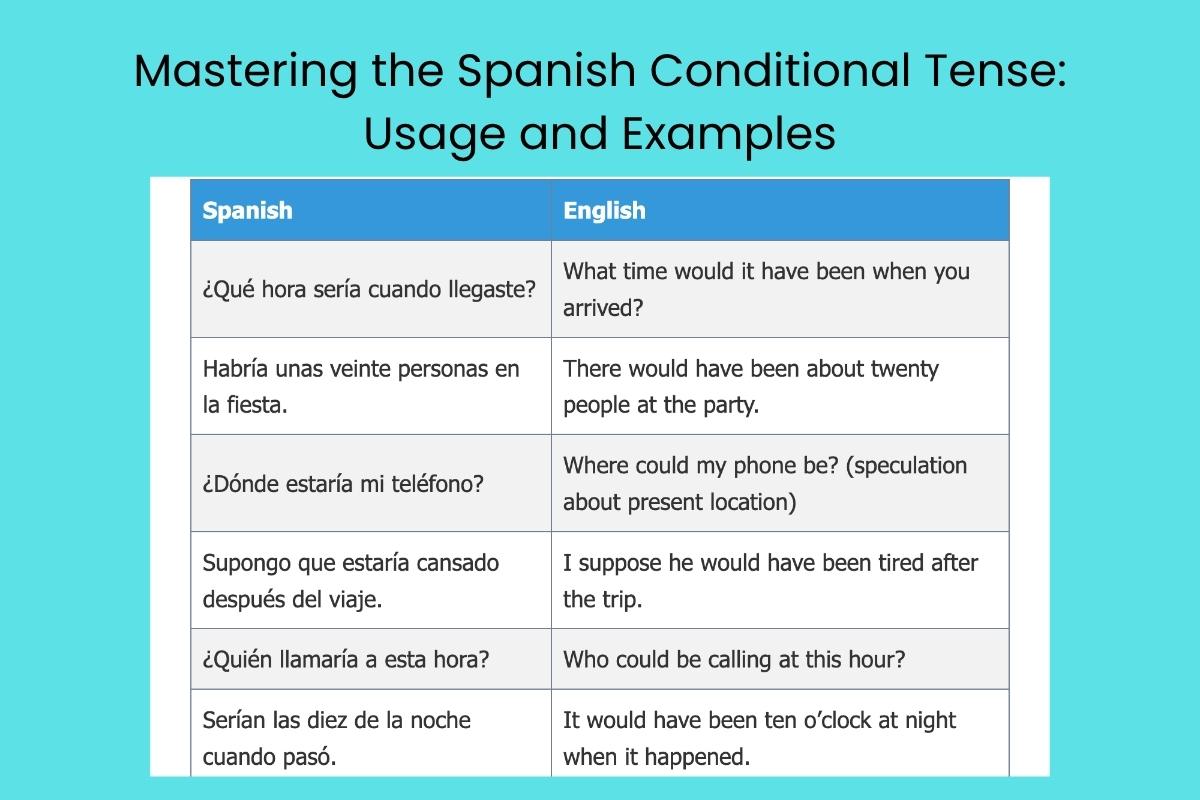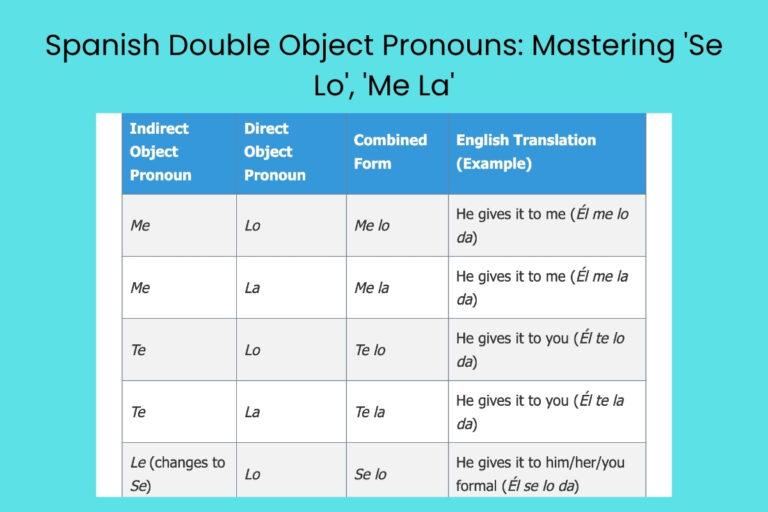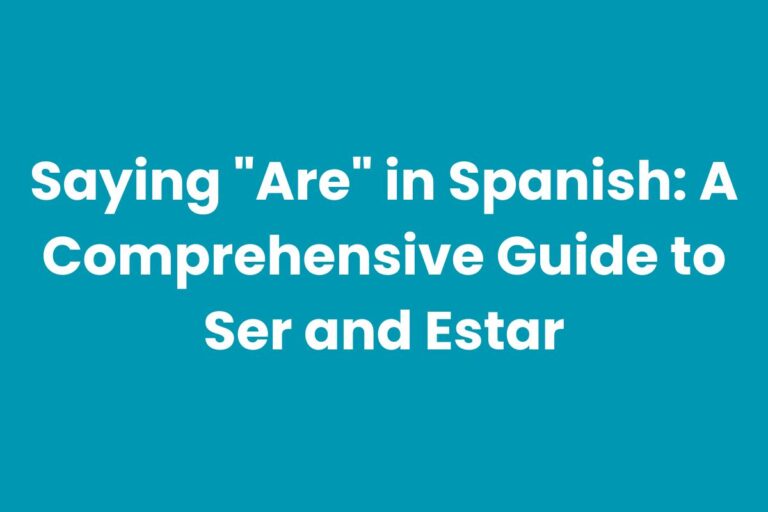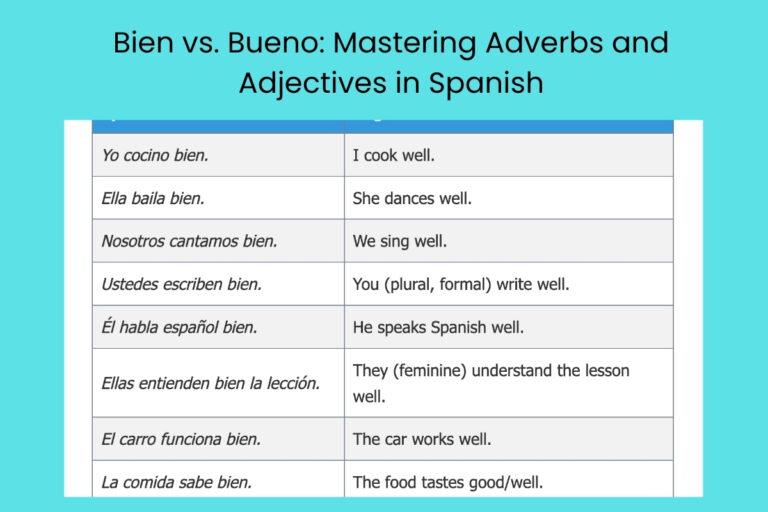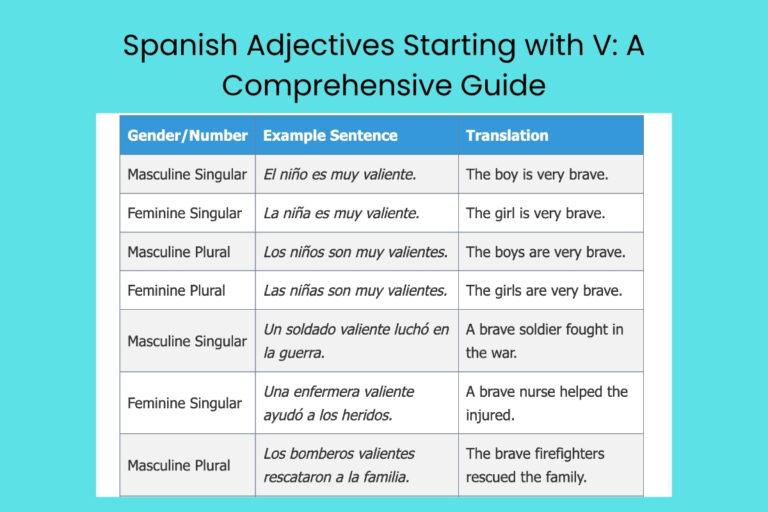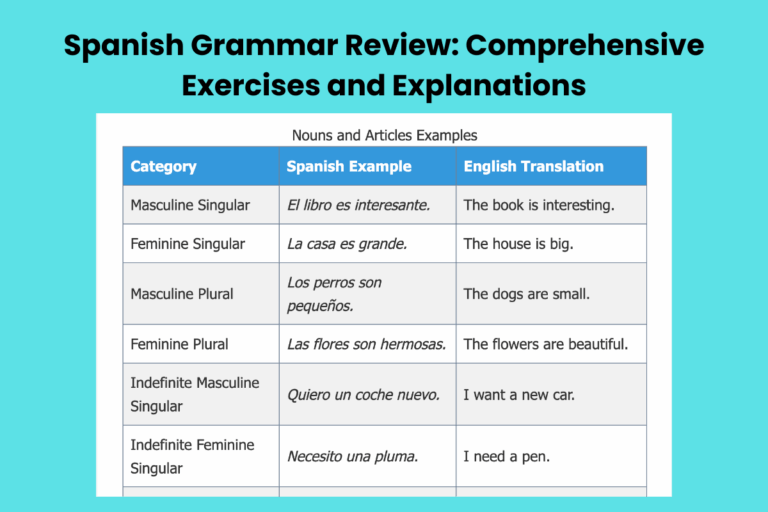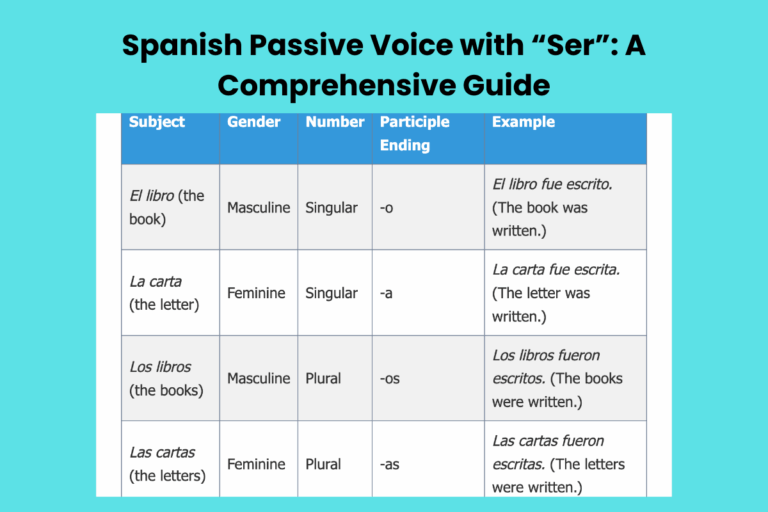Mastering the Spanish Conditional Tense: Usage and Examples
The Spanish conditional tense, or condicional simple, is essential for expressing hypothetical situations, polite requests, and future actions viewed from the past. Understanding this tense allows you to convey nuanced meanings and engage in more sophisticated conversations. This article provides a comprehensive guide to the Spanish conditional tense, covering its formation, usage, and common pitfalls. Whether you’re a beginner or an advanced learner, this resource will equip you with the knowledge and practice needed to master this crucial aspect of Spanish grammar.
Table of Contents
- Definition of the Spanish Conditional Tense
- Structural Breakdown of the Conditional Tense
- Types and Categories of Conditional Sentences
- Examples of the Conditional Tense
- Usage Rules for the Conditional Tense
- Common Mistakes with the Conditional Tense
- Practice Exercises
- Advanced Topics in the Conditional Tense
- Frequently Asked Questions
- Conclusion
Definition of the Spanish Conditional Tense
The Spanish conditional tense, known as el condicional simple or el pospretérito, expresses hypothetical situations. It indicates what would happen under certain conditions. It is also used for making polite requests, giving advice, and expressing uncertainty about past events. The conditional tense bridges the gap between possibility and reality, adding a layer of nuance to communication.
Functionally, the conditional tense serves multiple purposes. It allows speakers to speculate about future outcomes based on present or past conditions.
It softens requests, making them more courteous. Furthermore, it can express probability or conjecture regarding past actions or events.
Therefore, mastering the conditional tense is crucial for effective communication in Spanish.
Contextually, the conditional tense appears in varied settings. It is commonly used in conditional sentences, where one clause describes a condition and the other expresses the result if that condition were met.
It is also prevalent in formal speech and writing, where politeness and indirectness are valued. In everyday conversation, the conditional can be used to express desires, suggestions, or hypothetical scenarios.
Structural Breakdown of the Conditional Tense
The conditional tense is formed by adding specific endings to the entire infinitive of the verb. This is a key difference from other tenses where the infinitive stem is modified. The conditional endings are the same for all three verb conjugations (-ar, -er, and -ir). This makes it relatively straightforward to learn and apply.
Regular Verb Conjugation
For regular verbs, the conditional tense is formed by adding the following endings to the infinitive:
- -ía (yo)
- -ías (tú)
- -ía (él/ella/usted)
- -íamos (nosotros)
- -íais (vosotros)
- -ían (ellos/ellas/ustedes)
Here’s a table illustrating the conjugation of regular verbs in the conditional tense:
| Pronoun | -AR Verbs (e.g., hablar) | -ER Verbs (e.g., comer) | -IR Verbs (e.g., vivir) |
|---|---|---|---|
| Yo | hablaría | comería | viviría |
| Tú | hablarías | comerías | vivirías |
| Él/Ella/Usted | hablaría | comería | viviría |
| Nosotros | hablaríamos | comeríamos | viviríamos |
| Vosotros | hablaríais | comeríais | viviríais |
| Ellos/Ellas/Ustedes | hablarían | comerían | vivirían |
Irregular Verb Conjugation
Some verbs have irregular stems in the conditional tense, similar to their irregular stems in the future tense. However, the conditional endings remain the same. Common irregular verbs include tener, poner, salir, venir, decir, hacer, poder, and saber. These verbs require memorization of their stem changes.
Here are some examples of irregular verbs in the conditional tense:
- Tener (to have) -> Tendría
- Poner (to put) -> Pondría
- Salir (to leave) -> Saldría
- Venir (to come) -> Vendría
- Decir (to say) -> Diría
- Hacer (to do/make) -> Haría
- Poder (to be able to) -> Podría
- Saber (to know) -> Sabría
A table illustrating the conjugation of common irregular verbs in the conditional tense:
| Pronoun | Tener (to have) | Poner (to put) | Salir (to leave) | Venir (to come) | Decir (to say) | Hacer (to do/make) | Poder (to be able to) | Saber (to know) |
|---|---|---|---|---|---|---|---|---|
| Yo | tendría | pondría | saldría | vendría | diría | haría | podría | sabría |
| Tú | tendrías | pondrías | saldrías | vendrías | dirías | harías | podrías | sabrías |
| Él/Ella/Usted | tendría | pondría | saldría | vendría | diría | haría | podría | sabría |
| Nosotros | tendríamos | pondríamos | saldríamos | vendríamos | diríamos | haríamos | podríamos | sabríamos |
| Vosotros | tendríais | pondríais | saldríais | vendríais | diríais | haríais | podríais | sabríais |
| Ellos/Ellas/Ustedes | tendrían | pondrían | saldrían | vendrían | dirían | harían | podrían | sabrían |
Types and Categories of Conditional Sentences
Conditional sentences in Spanish are typically classified into three main types, each expressing different degrees of possibility and time frames.
Type 1: Possible or Probable Conditions
These conditionals refer to likely or possible situations in the present or future. They use the present indicative in the “if” clause (si clause) and the future indicative or imperative in the main clause.
Example: Si estudio, aprobaré el examen. (If I study, I will pass the exam.)
Type 2: Improbable or Hypothetical Conditions
These conditionals describe unlikely or hypothetical situations in the present or future. They use the imperfect subjunctive in the “if” clause and the conditional simple in the main clause.
Example: Si tuviera dinero, viajaría por el mundo. (If I had money, I would travel the world.)
Type 3: Impossible or Contrary-to-Fact Conditions
These conditionals refer to past situations that did not happen. They use the pluperfect subjunctive in the “if” clause and the conditional perfect (habría + past participle) in the main clause.
Example: Si hubiera estudiado, habría aprobado el examen. (If I had studied, I would have passed the exam.)
Examples of the Conditional Tense
The conditional tense is versatile and can be used in various contexts. Here are some examples categorized by usage.
Expressing Hypothetical Situations
The most common use of the conditional tense is to describe hypothetical or imagined scenarios. These situations are dependent on certain conditions being met.
| Spanish | English |
|---|---|
| Yo viajaría a España si tuviera tiempo. | I would travel to Spain if I had time. |
| Ella comería pizza todos los días si pudiera. | She would eat pizza every day if she could. |
| Nosotros compraríamos una casa nueva si ganáramos la lotería. | We would buy a new house if we won the lottery. |
| Ellos irían a la fiesta si no estuvieran enfermos. | They would go to the party if they weren’t sick. |
| Tú estudiarías más si tuvieras mejores notas. | You would study more if you had better grades. |
| Usted trabajaría menos si tuviera suficiente dinero. | You (formal) would work less if you had enough money. |
| Si yo fuera tú, no haría eso. | If I were you, I wouldn’t do that. |
| Si ella supiera la verdad, estaría muy triste. | If she knew the truth, she would be very sad. |
| Si nosotros viviéramos en la playa, nadaríamos todos los días. | If we lived on the beach, we would swim every day. |
| Si ellos tuvieran un coche, viajarían más. | If they had a car, they would travel more. |
| Si tú fueras más valiente, hablarías con él. | If you were braver, you would talk to him. |
| Si usted tuviera tiempo, ¿qué haría? | If you (formal) had time, what would you do? |
| Yo lo haría diferente si tuviera otra oportunidad. | I would do it differently if I had another chance. |
| Ella lo entendería si se lo explicaras. | She would understand it if you explained it to her. |
| Nosotros lo terminaríamos si tuviéramos más ayuda. | We would finish it if we had more help. |
| Ellos lo aceptarían si les ofrecieras más dinero. | They would accept it if you offered them more money. |
| Tú lo sabrías si me hubieras preguntado. | You would know it if you had asked me. |
| Usted lo vería si abriera los ojos. | You (formal) would see it if you opened your eyes. |
| Si yo ganara la lotería, donaría parte del dinero a la caridad. | If I won the lottery, I would donate some of the money to charity. |
| Si ella fuera presidenta, cambiaría muchas cosas. | If she were president, she would change many things. |
Making Polite Requests and Suggestions
The conditional tense softens requests, making them more polite and less demanding. It is also used to make suggestions in a courteous manner.
| Spanish | English |
|---|---|
| ¿Podrías ayudarme, por favor? | Could you help me, please? |
| ¿Te importaría cerrar la ventana? | Would you mind closing the window? |
| Deberías estudiar más para el examen. | You should study more for the exam. (advice) |
| ¿Querrías venir a cenar con nosotros? | Would you like to come to dinner with us? |
| Me gustaría un café, por favor. | I would like a coffee, please. |
| ¿Podrías decirme la hora, por favor? | Could you tell me the time, please? |
| ¿Te gustaría ir al cine esta noche? | Would you like to go to the cinema tonight? |
| Podrías intentar hablar con él. | You could try talking to him. |
| Deberías descansar un poco. | You should rest a little. |
| ¿Querrías un vaso de agua? | Would you like a glass of water? |
| Me gustaría hablar contigo en privado. | I would like to speak with you in private. |
| ¿Podrías prestarme tu libro? | Could you lend me your book? |
| ¿Te importaría si me sentara aquí? | Would you mind if I sat here? |
| Deberías considerar esta oferta. | You should consider this offer. |
| ¿Querrías probar este pastel? | Would you like to try this cake? |
| Me gustaría hacer una reserva. | I would like to make a reservation. |
| ¿Podrías repetirlo, por favor? | Could you repeat it, please? |
| ¿Te gustaría bailar? | Would you like to dance? |
| Deberías visitar ese museo. | You should visit that museum. |
| ¿Querrías tomar un café conmigo? | Would you like to have a coffee with me? |
Expressing Uncertainty or Conjecture about the Past
The conditional tense can also be used to express uncertainty or speculation about past events. This is often used when the speaker is not sure about something that happened.
| Spanish | English |
|---|---|
| ¿Qué hora sería cuando llegaste? | What time would it have been when you arrived? |
| Habría unas veinte personas en la fiesta. | There would have been about twenty people at the party. |
| ¿Dónde estaría mi teléfono? | Where could my phone be? (speculation about present location) |
| Supongo que estaría cansado después del viaje. | I suppose he would have been tired after the trip. |
| ¿Quién llamaría a esta hora? | Who could be calling at this hour? |
| Serían las diez de la noche cuando pasó. | It would have been ten o’clock at night when it happened. |
| ¿Qué estaría pensando en ese momento? | What could he have been thinking at that moment? |
| Habría llovido mucho esa noche. | It must have rained a lot that night. |
| ¿Por qué haría eso? | Why would he do that? |
| Estaría enfadado por algo. | He must have been angry about something. |
| ¿Quién habría roto el jarrón? | Who could have broken the vase? |
| Sería una persona muy descuidada. | It would have been a very careless person. |
| ¿Dónde habría dejado las llaves? | Where could I have left the keys? |
| Estarían jugando en el jardín. | They must have been playing in the garden. |
| ¿Qué habría pasado si no hubieras llegado? | What would have happened if you hadn’t arrived? |
| Estaríamos en problemas. | We would have been in trouble. |
| ¿Quién habría esperado eso? | Who would have expected that? |
| Nadie lo habría creído. | Nobody would have believed it. |
| ¿Qué habría hecho sin tu ayuda? | What would I have done without your help? |
| No lo habría logrado. | I wouldn’t have made it. |
Usage Rules for the Conditional Tense
The conditional tense has specific rules governing its usage. Understanding these rules is crucial for using the tense correctly.
Rule 1: Expressing Hypothetical Actions
The primary use of the conditional tense is to express actions that would occur under certain conditions. These conditions are often stated in an “if” clause using the imperfect subjunctive.
Example: Si tuviera más tiempo, leería más libros. (If I had more time, I would read more books.)
Rule 2: Making Polite Requests
The conditional tense softens requests and makes them more courteous. This is particularly common with verbs like poder (to be able to) and querer (to want).
Example: ¿Podrías ayudarme con esto? (Could you help me with this?)
Rule 3: Giving Advice or Suggestions
The conditional tense can be used to give advice or make suggestions in a gentle and indirect way. Often, the verb deber (should) is used in the conditional form.
Example: Deberías hablar con él. (You should talk to him.)
Rule 4: Expressing Uncertainty About the Past
The conditional tense can express speculation or uncertainty about past events. In this context, it suggests a possibility rather than a certainty.
Example: ¿Qué hora sería cuando llegaste? (What time would it have been when you arrived?)
Rule 5: Sequence of Tenses
In conditional sentences, the tense used in the “if” clause determines the tense used in the main clause. The imperfect subjunctive in the “if” clause is typically followed by the conditional simple in the main clause.
Example: Si yo fuera tú, no haría eso. (If I were you, I wouldn’t do that.)
Common Mistakes with the Conditional Tense
Learners often make specific mistakes when using the conditional tense. Recognizing and correcting these errors is essential for mastering the tense.
Mistake 1: Using the Future Tense Instead of the Conditional
Using the future tense instead of the conditional in hypothetical situations is a common error. The conditional expresses what would happen, while the future expresses what will happen.
- Incorrect: Si tengo tiempo, iré al cine.
- Correct: Si tuviera tiempo, iría al cine. (If I had time, I would go to the cinema.)
Mistake 2: Incorrect Verb Endings
Using the wrong verb endings for the conditional tense is another frequent mistake. Remember that the conditional endings are the same for all verb conjugations.
- Incorrect: Yo hablaré si me preguntas.
- Correct: Yo hablaría si me preguntaras. (I would speak if you asked me.)
Mistake 3: Confusing the Conditional Simple with the Conditional Perfect
The conditional simple (e.g., hablaría) expresses hypothetical actions in the present or future, while the conditional perfect (e.g., habría hablado) expresses hypothetical actions in the past.
- Incorrect: Si hubiera estudiado, aprobaría el examen.
- Correct: Si hubiera estudiado, habría aprobado el examen. (If I had studied, I would have passed the exam.)
Mistake 4: Misusing Irregular Verbs
Forgetting to use the irregular stem for irregular verbs in the conditional tense is a common error. Remember to memorize the irregular stems.
- Incorrect: Yo tenaría mucho dinero si ganara la lotería.
- Correct: Yo tendría mucho dinero si ganara la lotería. (I would have a lot of money if I won the lottery.)
Practice Exercises
Practice is essential for mastering the conditional tense. Here are some exercises to help you practice.
Exercise 1: Fill in the Blanks
Complete the following sentences with the correct form of the verb in the conditional tense.
| Sentence | Verb | Answer |
|---|---|---|
| Yo ________ (viajar) a Italia si tuviera dinero. | viajar | viajaría |
| ¿Tú ________ (comer) más sano si pudieras? | comer | comerías |
| Ella ________ (vivir) en la playa si no tuviera que trabajar. | vivir | viviría |
| Nosotros ________ (estudiar) más si el examen fuera más difícil. | estudiar | estudiaríamos |
| Vosotros ________ (salir) más si tuvierais más tiempo libre. | salir | saldríais |
| Ellos ________ (hacer) un viaje si tuvieran vacaciones. | hacer | harían |
| Usted ________ (tener) más amigos si fuera más sociable. | tener | tendría |
| ¿Qué ________ (decir) tú si te preguntaran eso? | decir | dirías |
| Yo ________ (poner) más atención si la clase fuera interesante. | poner | pondría |
| Nosotros ________ (poder) ayudarte si supieras qué necesitas. | poder | podríamos |
Exercise 2: Translate the Sentences
Translate the following sentences into Spanish using the conditional tense.
| English Sentence | Spanish Translation |
|---|---|
| I would buy a car if I had money. | Yo compraría un coche si tuviera dinero. |
| She would travel the world if she could. | Ella viajaría por el mundo si pudiera. |
| We would eat pizza every day if it were healthy. | Nosotros comeríamos pizza todos los días si fuera saludable. |
| They would study more if they had better teachers. | Ellos estudiarían más si tuvieran mejores profesores. |
| You would be happier if you lived in Spain. | Serías más feliz si vivieras en España. |
| Could you help me, please? | ¿Podrías ayudarme, por favor? |
| Would you like a cup of coffee? | ¿Te gustaría una taza de café? |
| I would like to order a pizza. | Me gustaría pedir una pizza. |
| He should study more. | Él debería estudiar más. |
| What time would it be? | ¿Qué hora sería? |
Exercise 3: Conditional Sentences
Create conditional sentences using the prompts provided. Use the imperfect subjunctive in the “if” clause and the conditional simple in the main clause.
| Prompt | Answer |
|---|---|
| Si yo / tener / más tiempo / viajar / por el mundo | Si yo tuviera más tiempo, viajaría por el mundo. |
| Si ella / ser / rica / comprar / una casa grande | Si ella fuera rica, compraría una casa grande. |
| Si nosotros / saber / la verdad / decir / algo | Si nosotros supiéramos la verdad, diríamos algo. |
| Si ellos / poder / venir / a la fiesta / estar / felices | Si ellos pudieran venir a la fiesta, estarían felices. |
| Si tú / estudiar / más / aprobar / el examen | Si tú estudiaras más, aprobarías el examen. |
| Si usted / hablar / español / entender / la película | Si usted hablara español, entendería la película. |
| Si yo / ser / tú / no / hacer / eso | Si yo fuera tú, no haría eso. |
| Si ella / tener / un coche / ir / de viaje | Si ella tuviera un coche, iría de viaje. |
| Si nosotros / vivir / en la playa / nadar / todos los días | Si nosotros viviéramos en la playa, nadaríamos todos los días. |
| Si ellos / ganar / la lotería / donar / dinero / a la caridad | Si ellos ganaran la lotería, donarían dinero a la caridad. |
Advanced Topics in the Conditional Tense
For advanced learners, there are more complex aspects of the conditional tense to explore.
The Conditional Perfect Tense
The conditional perfect tense (condicional compuesto) is used to express hypothetical actions that would have happened in the past if a certain condition had been met. It is formed using the conditional simple of the verb haber (to have) + the past participle of the main verb.
Example: Si hubiera estudiado, habría aprobado el examen. (If I had studied, I would have passed the exam.)
Using the Conditional Tense to Express Doubt or Surprise
The conditional tense can also be used to express doubt or surprise about something that has happened. This usage is less common but adds nuance to communication.
Example: ¿Sería posible que él haya dicho eso? (Could it be possible that he said that?)
Combining Conditional Sentences
Advanced learners can combine different types of conditional sentences to create more complex and nuanced expressions. This requires a solid understanding of all the conditional forms and their respective usages.
Frequently Asked Questions
Here are some frequently asked questions about the Spanish conditional tense.
- What is the difference between the future tense and the conditional tense?
The future tense expresses actions that will happen, while the conditional tense expresses actions that would happen under certain conditions. The conditional tense implies a hypothetical situation, whereas the future tense indicates a planned or expected event. For example, “Iré al cine” (I will go to the cinema) is a statement of intent, while “Iría al cine si tuviera tiempo” (I would go to the cinema if I had time) expresses a hypothetical scenario.
- How do I know when to use the conditional tense?
Use the conditional tense when you want to express hypothetical situations, make polite requests, give advice, or express uncertainty about past events. The context of the sentence will usually indicate whether the conditional tense is appropriate. Look for phrases like “si” (if) or situations where you are being polite or speculative.
- Are there any regional variations in the use of the conditional tense?
While the basic formation and usage of the conditional tense are consistent across Spanish-speaking regions, there may be slight variations in colloquial expressions or preferences. However, the standard rules apply universally. In some regions, speakers might use the imperfect subjunctive in place of the conditional for polite requests, but this is less common in formal settings.
- How do I conjugate irregular verbs in the conditional tense?
Irregular verbs in the conditional tense have irregular stems, but the endings are the same as for regular verbs. You need to memorize the irregular stems for verbs like tener (tendr-), poner (pondr-), salir (saldr-), venir (vendr-), decir (dir-), hacer (har-), poder (podr-), and saber (sabr-). Then, add the standard conditional endings (-ía, -ías, -ía, -íamos, -íais, -ían) to the stem.
- Can I use the conditional tense in the “if” clause of a conditional sentence?
No, the conditional tense is generally not used in the “if” clause of a conditional sentence. The “if” clause typically uses the present indicative (for possible conditions) or the imperfect subjunctive (for improbable or hypothetical conditions). The conditional tense is used in the main clause to express the result of the condition.
- What is the difference between deber and debería?
Deber means “to owe” or “must,” while debería is the conditional form of deber and means “should.” Debería is used to give advice or express an obligation in a softer, more polite way. For example, “Debes estudiar” (You must study) is a strong obligation, while “Deberías estudiar” (You should study) is a suggestion.
- How do I form the conditional perfect tense?
The conditional perfect tense is formed by combining the conditional simple of the verb haber (to have) with the past participle of the main verb. The formula is: habría + past participle (e.g., habría hablado, habrías comido, habría vivido).
- When should I use the conditional perfect tense instead of the conditional simple tense?
Use the conditional perfect tense when you want to express a hypothetical action that would have happened in the past if a certain condition had been met. This tense is used to talk about unrealized possibilities in the past. For example, “Si hubiera estudiado, habría aprobado el examen” (If I had studied, I would have passed the exam) refers to a past action that did not occur.
- Is it possible to mix conditional tenses in a single sentence?
While it’s generally best to keep conditional sentences consistent, advanced learners can mix tenses for specific effects. This usually involves combining different types of conditional sentences to express complex relationships between past, present, and future hypothetical situations. However, this should be done carefully to avoid confusion.
- Where can I find more practice exercises for the conditional tense?
Many online resources offer practice exercises for the conditional tense, including language learning websites, grammar tutorials, and interactive quizzes. Additionally, textbooks and workbooks often include exercises specifically designed to practice the conditional tense. Look for resources that provide immediate feedback and explanations to help you learn from your mistakes.
Conclusion
The Spanish conditional tense is a powerful tool for expressing hypothetical situations, polite requests, and uncertainty about the past. By understanding its formation, usage rules, and common pitfalls, you can significantly enhance your ability to communicate effectively in Spanish.
Consistent practice and attention to detail are key to mastering this essential aspect of Spanish grammar.
Remember to focus on recognizing the context in which the conditional tense is used and practicing its conjugation with both regular and irregular verbs. Pay attention to the sequence of tenses in conditional sentences and avoid common mistakes such as confusing the conditional with the future tense.
With dedicated effort, you can confidently use the conditional tense to add nuance and sophistication to your Spanish
communication.

